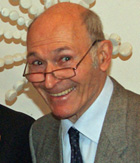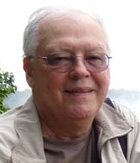Distinguished Guests
In recognition of the Congress’ aims to focus on the "next generation", we have the great pleasure in welcoming Ferruccio Ritossa and Irun Cohen as our Distinguished Guests.
Ferruccio Ritossa – Sculptor

"...it will be very interesting to partake in the flow of thoughts and information provided by this excursion from past to future on the subject of cell stress" Ferruccio Ritossa, December 2012.
Ferruccio Ritossa was born in Istria in 1936. After graduating in Agricultural Sciences at the University of Bologna in 1959, he carried out his studies on Genetics in Pavia, in Naples at the International Institute of Genetics and Biophysics and then in the United States.
Among his major achievements is the discovery of the Heat Shock response in Drosophila. After teaching Genetics at the Universities of Bari and Bologna, he decided to leave the Academy in 1992 and devote himself to Sculpture.
"It did not matter if this interpretation was true or false," he said. "It was a working link between imagination and reality, like love." This is how I will always remember Ferruccio, as a scientist, an artist, and a poet.
Gabriella Santoro quoting Ferruccio in the article "Ferruccio Ritossa's scientific legacy 50 years after his discovery of the heat shock response: A new view of biology, a new society, and a new journal", Cell Stress & Chaperones 17(2), 2012  .
.
Irun Cohen – Immunologist

Professor Irun Cohen is a leading experimental and theoretical immunologist who challenges current dogma and has the vision to propose new alternatives. He moved from the U.S. to Israel in 1968 and is now an Emeritus Professor at the Weizmann Institute of Science.
His numerous contributions to immunology include, in 1989, the development of the theory of the immunological homunculus, a hypothetical self-image which is used by the immune system to govern its responses. He is also the author of Tending Adam’s Garden, a book which describes and explains the way in which our immune system works from a novel perspective. The book uses metaphors and examples to bring the immune system to life and explores the fundamental miracle of nature.
A major focus of Professor Cohen's research is aimed at developing treatments for autoimmune disease, some of these involve the use of heat shock proteins as therapeutic molecules.
This is a very rare opportunity to welcome Ferruccio and Irun as our Distinguished Guests.
Lawrence E. Hightower

Lawrence E. Hightower received his B.S. degree summa cum laude in chemistry from Hampden-Sydney College in Virginia. He was elected to Phi Beta Kappa in 1968. He received his Ph.D. degree from Harvard University in Biochemistry, worked for a year as an instructor in microbiology at University of Massachusetts Medical School, and in 1975, he was appointed Assistant Professor of Biology at the University of Connecticut. In 1997, Dr. Hightower was elected Fellow of the American Association for the Advancement of Science. The Fellow award was proposed by the Biology Section of the AAAS for pioneering work on cellular stress responses including the heat stress responses of desert fish. In 1998, he was presented the University of Connecticut Board of Trustees Outstanding Achievement Award. He was the Founding President of the Cell Stress Society International and Founding Editor-in-Chief of Cell Stress and Chaperones, the leading specialty journal in his field. He retired from the University in 2007 as Professor and Associate Head of the Department of Molecular and Cell Biology.
Please wait... Checking Javascript functionality

If you continue to see this sentence for more than 20 seconds,
please enable Javascript in your browser.
The advanced functionality of this site depends on Javascript. We are sorry, but the contents of this page cannot be displayed by your browser in its current state.
For instructions on how to activate Javascript in your browser, you may try this link (you will be re-directed to a website not associated with Azuleon but, last time we checked, the instructions there were clear and accurate).
For any further assistance, please contact the Azuleon webmaster.
Registrations
&
Abstracts
27 March 2013
to
3 July 2013
Payment
4 April 2013
to
3 July 2013

